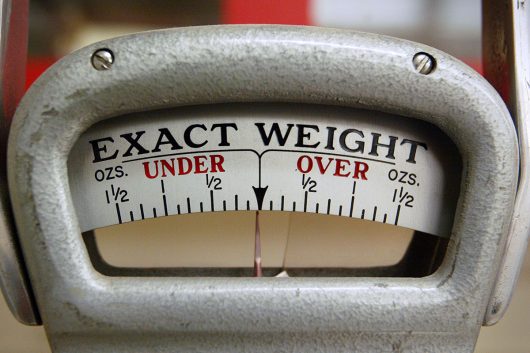
The RPAC encourages use of BMI and body fat percentage as measures of health as opposed to traditional scales. Credit: Courtesy of TNS
The number on the scale can’t define a person if there isn’t a number at all.
Carleton University in Ottawa, Ontario, removed the scale from its fitness center in March because scales are “not considered a good health marker,” Bruce Marshall, manager of wellness programs at the university, said in a statement, accoding to Today.com.
In the university’s campus newspaper, The Charlatan, a student defended the decision, saying scales can be “triggering” for those who struggle with eating disorders.
While other universities’ fitness centers are following suit — a gym at California State, Chico removed its scales for National Eating Disorder Awareness Week, for example — one Ohio State eating disorder expert said OSU and the RPAC offer other solutions for those who might be triggered by the scale.
Dr. Kate Adkins, senior staff therapist and chair of the Eating Disorder Treatment Team on campus, said she and her team encourage those with eating disorders to control weighing behaviors by working with a team of professionals to construct individualized plans.
“That might involve avoiding scales,” Adkins said. “Some of our students with eating disorders know where the scales are in the RPAC and they have individualized plans with their therapist to take a different route in the RPAC to avoid them because they have really strong urges to weigh.”
In the RPAC, there is one scale in each of the locker rooms on the bottom floor and one in the hallway on the way into the main weight room, said Bailey Socha, sport shop attendant in member services at the RPAC and second-year in strategic communications.
Frequent weighing is often a compulsive eating disorder behavior, Adkins said. College students often have unhealthy perceptions of what their appropriate weights are, holding on to their high school or teenage weight.
“There are a lot of strategies that people with eating disorders use to reduce anxiety,” Adkins said. “It might be things like body checking, like touching parts of their bodies such as their stomach, their thighs or their arms as a way of constant reassurance, and weighing is another strategy.”
Carleton University came under fire on social media for removing the scale with students using the hashtag #bringbackthescale on Twitter. The university responded saying it removed them to hopefully encourage students to look at other indicators of health, besides weight, Today.com reported.
“It’s not a simple issue,” Adkins said. “There are benefits and limitations to both having access and not having access to a scale. Weight is only one indicator of health. There is an obsession on weight as a health indicator in a really unhealthy way.”
Body mass index and body fat percentage are can be used as more complete measurements of health than just weight, because they take height and muscle into consideration as well, Socha said.
“The RPAC offers a skin caliper which can be used to calculate body fat percentage and BMI,” Socha said. “The Physical Activity and Education Services building, connected to the RPAC, has additional scales that can be used to calculate BMI and body fat percentage as well.”
The BMI and body fat percentage tests are great resources even for people who don’t have eating disorders, Adkins said. Regardless, even with these tests, individuals with eating disorders often have unhealthy perceptions of what their appropriate weight and measurements should be.
“I think if you have an eating disorder, the best resource for what a healthy weight is should come from a professional team of a medical provider, a therapist and a dietician that are very individualized,” Adkins said.
Eating disorder resources and consultation services can be found on the Office of Student Life Counseling and Consultation Service website.


